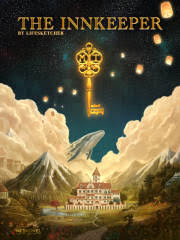The Story in 3 Sentences
Bu Fang, a twenty-year-old chef from Earth, suddenly awakens in a fantasy world where martial artists can split mountains with a wave of their hand, and discovers the mysterious Gourmet System has appeared in his brain.
With the system’s help, he opens a small restaurant in an alleyway of the imperial city, serving divine dishes that attract apex existences and powerful cultivators who come rushing to taste his legendary egg-fried rice and other magical cuisines.
As Bu Fang masters increasingly complex cooking techniques and recipes, he gradually transforms from an ordinary chef into a culinary god whose food can enhance cultivation, trigger breakthroughs, and even affect the balance of power in the cultivation world.
Why It Stands Out
1. The Culinary Cultivation Revolution
Unlike traditional power fantasy novels, strength comes through mastering cooking techniques and creating divine dishes, with the protagonist’s restaurant becoming a neutral ground where even enemies must follow strict dining etiquette or face magical consequences.
2. Comedy Gold Through Food Obsession
The humor emerges naturally from powerful cultivators acting like food addicts, desperately trying to get reservations at a small restaurant while being scolded by a seemingly weak chef who treats emperors and sect masters like unruly customers.
3. Slice of Life Meets Epic Fantasy
The story brilliantly balances peaceful restaurant management with grand cultivation adventures, creating a unique tone where cooking competitions carry the same tension as life-or-death battles between immortals.
Characters That Leave a Mark
There’s Ouyang Xiaoyi – a gluttonous little troublemaker from the Imperial City who becomes Bu Fang’s first loyal waitress, bringing her mischievous energy and genuine enthusiasm to help run the restaurant despite her tendency to create chaos.
You’ll meet Whitey, the powerful puppet creation from the system who serves as the restaurant’s bouncer, effortlessly handling troublesome customers while maintaining an adorable obsession with ice cream and sweet treats.
And Blacky? They’re the mysterious black dog who appears to be lazy and only interested in sleeping and eating, but harbors the secret identity as the reincarnation of the Time Heavenly God with incredible hidden powers.
Killer Quotes
“In this restaurant, strength means nothing if you can’t appreciate good food.”
“Even emperors must wait in line for egg-fried rice.”
“The system provides fresh ingredients, but the heart provides the soul of cooking.”
Cultural Impact
The novel popularized the cooking-based power system in cultivation fiction, inspiring numerous imitators who tried to blend culinary arts with martial arts progression.
Fan communities frequently share their own interpretations of Bu Fang’s recipes, with some attempting to recreate the dishes described in the story using real-world ingredients.
The character dynamic between the stoic chef and his eccentric customers became a beloved trope, influencing other slice-of-life cultivation stories to focus more on everyday interactions.
Final Verdict
Start Here If You Want:
A refreshing take on cultivation where cooking skills matter more than sword techniques and restaurant management becomes a path to godhood
Comedy that emerges naturally from the clash between mundane restaurant life and the grandiose world of martial arts cultivation
A protagonist who gains respect through culinary mastery rather than violence, creating a unique power fantasy for food lovers
Study If You Love:
System novels with creative twists on traditional cultivation power progression mechanics
Slice-of-life stories that maintain epic scope while focusing on everyday restaurant operations and customer service
Character-driven comedy where supporting cast members each bring distinct personalities and relationship dynamics
Avoid If You Prefer:
Fast-paced action without extended focus on detailed food preparation and restaurant management sequences
Traditional cultivation stories without comedy elements or unconventional power systems based on non-combat skills
Serious tone throughout without the lighthearted moments that come from treating cooking as seriously as martial arts





